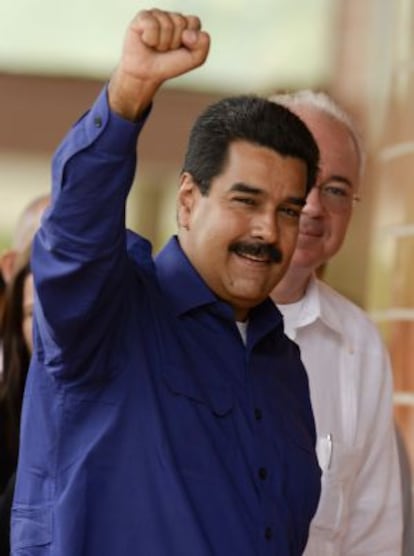Maduro steps up “petro-diplomacy”
Venezuelan president on whirlwind tour of region to shore up support for his electoral win


President Nicolás Maduro and his team are racking up travel miles and business promises across Latin America and the Caribbean in their search for support for the new Venezuelan government. By the time he lands in Caracas again this coming Thursday, Maduro will have visited four countries – Peru, Uruguay, Argentina and Brazil - and participated in two summits –Unasur and Petrocaribe — since he was proclaimed the winner of the April 14 presidential elections. Along the way, he has pledged to maintain and even boost Venezuela’s oil-based regional aid, despite the slump in the economy. In exchange, Hugo Chávez’s heir has asked his partners to ignore the Venezuelan opposition’s complaints directed at regional and European governments regarding electoral irregularities and Chavism’s crackdown on dissidents.
On Sunday, during a Petrocaribe summit held in Caracas, Maduro announced his first official trip to three member states of Mercosur “to continue completing the perfect equation of energy, financial, economic-productive, cultural and political integration.” On Tuesday Maduro was scheduled to meet with Uruguayan President José Mujica; on Wednesday with Argentina’s Cristina Fernández and on Thursday with Brazil’s Dilma Rousseff.
Venezuela, the last member to join the bloc, will hold Mercosur’s pro tempore presidency beginning on June 28. Beyond managing his own political legitimacy before this group, Maduro will have to mediate in the organization’s internal conflicts, including Uruguay’s complaints over Argentina’s control of exchange rates, which affects product sales, the freeze on Brazilian investment in Argentina, and the falling price of some of the group’s most prized raw materials such as soy, meat and oil.
He pledged to honor Chávez-era agreements to sell oil cheaply to partner states
Just minutes before unveiling this tour, the Venezuelan president pledged to honor the agreements to sell oil to partners under the system devised by former leader Hugo Chávez: 40 percent of the price due in 90 days, either in cash or in produce (beans, cows or sugar); and the rest payable over 17 to 25 years, with a two-year grace period, at an interest rate of one percent, but only while the price of a barrel of oil is above 40 dollars. Since 2005, the countries that make up Petrocaribe owe Caracas an accumulated debt of over 20 billion dollars, according to the Venezuela Central Bank; Dominican Republic is the biggest debtor with three billion dollars.
In total, there are 18 countries in the alliance –including Cuba, Nicaragua, Honduras, Guatemala, Dominican Republic and Honduras. With the exception of Cuba, each one of them has a vote in the Organization of American States and the United Nations, which could be used during any debate on the current political crisis in Venezuela.
The Venezuelan government has used the term “interventionist” to describe any outside opinion on the country’s tense post-electoral climate that is unfavorable to Maduro. Last Friday, the president recalled his ambassador from Lima after Peruvian Foreign Minister Rafael Roncagliolo told Unasur members to ask Maduro for “tolerance and dialogue” in his handling of Venezuela’s internal situation. Roncagliolo’s request was based on a prior statement, signed by the presidents of Unasur at a Lima meeting on April 18, which recognized Maduro’s victory at the polls, applauded the National Electoral Council’s decision to audit 100 percent of the votes and called on “dialogue and a commitment to preserve a climate of tolerance benefiting the entire Venezuelan nation.”
Since then, the following has happened: the vote recount has not taken place; some opposition leaders have been jailed or accused or “betraying the homeland;” and Chavist deputies in parliament prevented the opposition Democratic Union Committee from participating in congressional debate, even resorting to physical violence to stop them. However, Roncagliolo’s proposal has found no echo among Unasur countries - Bolivia, Ecuador, Chile, Argentina, Uruguay, Brazil, Colombia, Guyana and Surinam - although it did gain some traction in the parliaments and public opinions of Peru and Uruguay.
Tu suscripción se está usando en otro dispositivo
¿Quieres añadir otro usuario a tu suscripción?
Si continúas leyendo en este dispositivo, no se podrá leer en el otro.
FlechaTu suscripción se está usando en otro dispositivo y solo puedes acceder a EL PAÍS desde un dispositivo a la vez.
Si quieres compartir tu cuenta, cambia tu suscripción a la modalidad Premium, así podrás añadir otro usuario. Cada uno accederá con su propia cuenta de email, lo que os permitirá personalizar vuestra experiencia en EL PAÍS.
¿Tienes una suscripción de empresa? Accede aquí para contratar más cuentas.
En el caso de no saber quién está usando tu cuenta, te recomendamos cambiar tu contraseña aquí.
Si decides continuar compartiendo tu cuenta, este mensaje se mostrará en tu dispositivo y en el de la otra persona que está usando tu cuenta de forma indefinida, afectando a tu experiencia de lectura. Puedes consultar aquí los términos y condiciones de la suscripción digital.








































